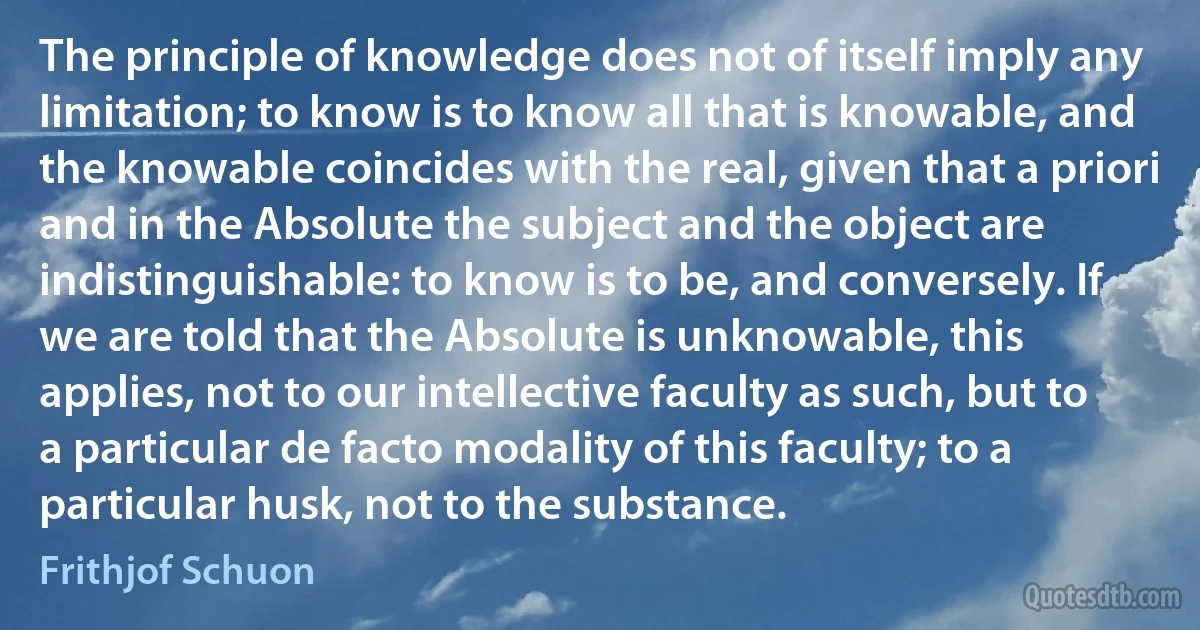Object Quotes - page 75
Out of the multitude of our sense experiences we take, mentally and arbitrarily, certain repeatedly occurring complexes of sense impression (partly in conjunction with sense impressions which are interpreted as signs for sense experiences of others), and we attribute to them a meaning the meaning of the bodily object.

Albert Einstein
When the happiness or misery of others depends in any respect upon our conduct, we dare not, as self–love might suggest to us, prefer the interest of one to that of many. The man within immediately calls to us, that we value ourselves too much and other people too little, and that, by doing so, we render ourselves the proper object of the contempt and indignation of our brethren.

Adam Smith
Of these the first is "melting," which is opposed to freezing. For things that are frozen, are closely bound together, so as to be hard to pierce. But it belongs to love that the appetite is fitted to receive the good which is loved, inasmuch as the object loved is in the lover...Consequently the freezing or hardening of the heart is a disposition incompatible with love: while melting denotes a softening of the heart, whereby the heart shows itself to be ready for the entrance of the beloved.

Thomas Aquinas
As with other modern artists, his readings provided not an organized outlook but a kind of metaphysical hum that surrounded his mental operations. His thinking was truly systematic only when it dealt with achieving the reality of the art object as a "creation out of nothing," which was a common theme in New York art after the last war and the break with the European past.

Harold Rosenberg
The interval during which a painting is mistaken for the real thing, or a real thing for a painting, is the triumphant moment of trompe l'oeil art. The artist appears to be potent as nature, if not superior to it. Almost immediately, though, the spectator's uncertainty is eliminated by his recognition that the counterfeit is counterfeit. Once the illusion is dissolved, what is left is an object that is interesting not as a work of art but as a successful simulation of something that is not art. The major response to it is curiosity: "How did he do it?"

Harold Rosenberg
• Again in keeping with the Supreme Court ruling on Augmentation, the committee proposed the insertion of the following statement in Sec. 70 entitled "Rules in the Realignment of Allotment Classes and Reprioritization of Items of Appropriations which states that: "In all cases of realignment, the existence of an appropriation in the Object of Expenditure and Allotment Class is necessary for realignment.”.

Francis Escudero
When our Lord says, 'I have not spoken of Myself' (Jn. 12:49), and again, 'As the Father said to Me, so I speak' (Jn. 12:50), and 'The word which you hear is not mine, but the Father's Who sent Me' (Jn. 14:24), and in another place, 'As the Father commanded Me, even so I do' (Jn. 14:31), it is not because He lacks deliberate purpose or power of initiative, nor yet because He has to wait for the preconcerted key-note, that He employs language of this kind. His object is to make it plain that His own will is connected in indissoluble union with the Father.

Basil of Caesarea
It is true that our everyday view of the world is not quite naively realistic, but that is what it would like to be. Common-sense is naively realistic wherever it does not think that there is some positive reason why it should cease to be so. And this is so in the vast majority of its perceptions. When we see a tree we think that it is really green and really waving about in precisely the same way as it appears to be. We do not think of our object of perception being 'like' the real tree, we think that what we perceive is the tree, and that it is just the same at a given moment whether it be perceived or not, except that what we perceive may be only a part of the real tree.

C. D. Broad
For the most trifling reasons, and sometimes for no conceivable reason at all, his majesty has rejected laws of the most salutary tendency. The abolition of domestic slavery is the great object of desire in those colonies where it was unhappily introduced in their infant state. But previous to the infranchisement of the slaves we have, it is necessary to exclude all further importations from Africa. Yet our repeated attempts to effect this by prohibitions, and by imposing duties which might amount to a prohibition, have been hitherto defeated by his majesty's negative: thus preferring the immediate advantages of a few British corsairs to the lasting interests of the American states, and to the rights of human nature deeply wounded by this infamous practice.

Thomas Jefferson
Men by their constitutions are naturally divided into two parties: 1. Those who fear and distrust the people, and wish to draw all powers from them into the hands of the higher classes. 2. Those who identify themselves with the people, have confidence in them, cherish and consider them as the most honest and safe, although not the most wise depositary of the public interests. In every country these two parties exist, and in every one where they are free to think, speak, and write, they will declare themselves. Call them, therefore, liberals and serviles, Jacobins and Ultras, whigs and tories, republicans and federalists, aristocrats and democrats, or by whatever name you please, they are the same parties still and pursue the same object. The last appellation of aristocrats and democrats is the true one expressing the essence of all.

Thomas Jefferson
The truth is, I was never a very good Party man. Probably but for the War of 1914, I should have gone on fairly comfortably as a Conservative official. But those four years burnt into me the insufferable conditions of international relations which made war the acknowledged method - indeed, the only fully authorized method - of settling international disputes. Thenceforth, the effort to abolish war seemed to me, and still seems to me, the only political object worth while.

Robert Cecil, 1st Viscount Cecil of Chelwood
I shall only add that on one material point I shall ever coincide with Ld. G. Germain, that is, against a separation from America, and that I shall never lose an opportunity of declaring that no consideration shall ever make me in the smallest degree an instrument in a measure that I am confident would anihilate [sic] the rank in which this British empire stands among the European States, and would render my situation in this country below continuing an object to me.

George III of the United Kingdom
The sign is usually considered as a correlation between a signifier and a signified (or between expression and content) and therefore as an action between pairs. Semiosis is, according to Peirce, "an action, or influence, which is, or involves, an operation of three subjects, such as a sign, its object, and its interpretant, this tri-relative influence not being in any way resolvable into an action between pairs".

Umberto Eco
Every specific semiotics (as every science) is concerned with general epistemological problems. It has to posit its own theoretical object, according to criteria of pertinence, in order to account for an otherwise disordered field of empirical data; and the researcher must be aware of the underlying philosophical assumptions that influence its choice and its criteria for relevance. Like every science, even a specific semiotics ought to take into account a sort of 'uncertainty principle' (as anthropologists must be aware of the fact that their presence as observers can disturb the normal course of the behavioral phenomena they observe). Notwithstanding, a specific semiotics can aspire to a 'scientific' status. Specific semiotics study phenomena that are reasonably independent of their observations.

Umberto Eco



